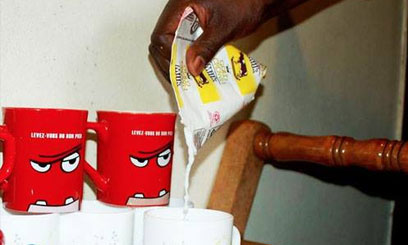NAIROBI, Kenya, Sep 6 – Any change, even a change for the better, is always accompanied by drawbacks and discomfort.
For Kenyans, the change is the recent implementation of the VAT law. And Kenyans, have not taken it lightly.
The 16 percent tax has led to increase of key food items, like wheat, maize, bread and milk.
Moses Otieno has been selling fish and beef for the last 10 years at City Market in Nairobi. And as the new VAT law comes into place, he is also forced to follow suit and increase the cost of his products to manage his profit margins.
“Since they announced this Act, customers have started shying off,” Otieno says, “For example a kilo of meat or fish which was going go for say Sh350 and you tell them it’s Sh500, the customers feel like you are extorting money from them. Like a half of them have gone away.”
“Some are complaining that they are taking their children back to school so they buy in small portions because of the tight budgets they have” he says during a spot check by Capital FM Business, “I used to sell 50 kilograms of meet everyday. Right now I find that by 1pm I have only sold only 10kgs.”
Otieno, who resides in Maringo area in Makadara, says he may later decide either to stay in the business or not.
Winnie, who works at the Stanley Hotel in Nairobi, says what hurts her most is the high cost of milk.
“I have three children and I usually buy 6 packets of milk every day. Now, for Sh55, I don’t know. I don’t have an option because the kids have to take the milk,” she says.
But from analytical point of view, Deloitte East Africa Tax leader Nikhil Hira says that the Act can have both the negative and positive impact.
First the new Act replaces an Act that was not well drafted and open to what he terms as abuse and it was important to replace it. This is because it had too many items that were zero rated or exempted hence denying the government enough revenue.
He adds that any tax law should be more clear, concise and unambiguous and our new Act goes a long way to achieve this.
“Currently VAT is not operating as it should and collections from the tax have struggled. This new Act should go some way to increasing revenue collections,” he says.
But while the new Act is much better and should result in easier compliance and administration, he says, the problem comes with the number of items that have moved into the tax net.
“We appear to have moved from one extreme to the other. Not much attempt has been made at finding the middle ground,” he noted, “The bigger worry is that it has happened on basic food commodities which are now mostly taxable at 16 percent resulting in increased prices at a time when the ‘wananchi’ are already struggling.”
Hira says with this there are a number of sectors of the economy that are going to be hard hit – small scale farming, pharmaceutical manufacturing and tourism.
“We need much better legislation that is more in keeping with 21st century business practice. Like any new legislation there are areas of concern which will need to be ironed out to protect some industries and the people. This will probably happen over time,” he concludes.
Kenyans also continue to express the view on social media.
One of the hash-tag on twitter is, #ThingsThatNeedMoreVAT and hear are some of the samples:
“@Thisguymyk, #ThingsThatNeedMoreVAT, I can already see the next milk ad ending like ‘Drink milk responsibly!”
“@itssoulo, #ThingsThatNeedMoreVAT If you want to impress a chick, buy her a liter of Milk.”
@SermonSayz #ThingsThatNeedMoreVAT, Gone are the days when we used to say, don’t cry over spilled milk!!!!”




No comments:
Post a Comment